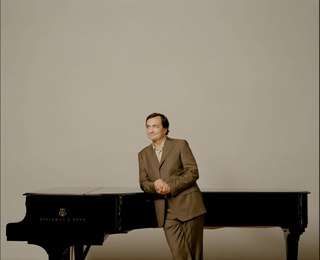|
Back
When Will Elliott Carter Finally Grow Up? New York
Stern Auditorium, Carnegie Hall
02/01/2010 -
Elliott Carter: Dialogues For Piano and Orchestra
Hector Berlioz: Harold in Italy: Symphony in four parts with viola solo, Opus 16
Maurice Ravel: Piano Concerto for the Left Hand – Daphnis et Chloé, Suite No. 2
Pierre-Laurent Aimard (Piano), Steven Ansell (Viola)
Boston Symphony Orchestra, James Levine (Conductor)

P.-L. Aimard (© Felix Broede/DG)
Opulent orchestras, sizzling soloists and incandescent conductors have been rolling into Carnegie Hall these last two weeks with the regularity of weekday subways. But like New York subways on a week-end, we have to expect the unexpected.
James Levine, conducting his old flagship the Boston Symphony Orchestra, delved back into the French specialties of an orchestra helmed by Munch, Monteux and Francophiles Ozawa and Koussevitzky. So one would expect them to sail through Harold and Daphnis. With Pierre-Laurent Aimard, the Ravel Left Hand Concerto would be a piece of gâteau.
But something else happened. Elliott Carter’s Dialogues for Piano and Orchestra, as played by M. Aimard and Mr. Levine. Until last year, I had read more about Elliott Carter than listened to him. The reading was tough, treacherous and scary. Then I heard the composer speak once, and his words were so lucid, his logic so patent, his personality so un-scary that I decided to give him more than a try.
When it came to Dialogues (written when Mr. Carter was a stripling of 95), the program notes were eschewed, and I listened to a rip-roaring “conversation” between pianist Aimard and the BSO. Yes, the harmonies were complex, the piano playing fearfully difficult–it was a virtual 14-minute toccata–but Mr. Carter turned a non-verbal dialogue into an interplay of vibrations and feelings.
An oboe solo became a recurring leitmotiv, but little more. Everybody in the orchestra pitched in. Mr. Aimard was hammering home cosmic etudes, while the string section played a thick legato hymn. A solo horn would bark, the piano would bark back, and then everybody went scurrying around for their own sounds.
We didn’t need any metaphor of “human dialogue”, since the music said it all. One could use words like “jaunty” or “mirthful” or “frothy”, but they would be meaningless. All that mattered were the notes Mr. Aimard sailed through with a combination of breathless fingers and an absolute delight in what his fingers accomplished.
Of course Mr. Carter was in the audience, rushing up to the stage to congratulate the artists and revel in the standing ovation. When will this 101-year-old child ever grow up?
Two first-chair players took their place last evening. Steven Ansell played viola in a rare performance of Harold in Italy. From Berlioz’s composition in 1834 to its New York premiere took almost 60 years, and I can’t remember it played in New York over the past few years. But, very much like Carter’s Dialogues, the work is as more a fantasy than a concerto. Mr. Levine conducted with scrupulous attention, but this was no Symphonie Fantastique, no opium dream. It was a symphonic poem, and Mr. Ansell played through it with nobility and–in the last measures played offstage with solo strings–the sorrows of past memories.
The return of Mr. Aimard–a very busy artist who could hardly count this an easy night–was welcomed for Ravel’s Concerto, one of the few surviving left-hand concertos commissioned by Paul Wittgenstein. (Though both the Prokofiev and Strauss should be in the repertory.) In its relatively short time, the piece has about four different moods. Mr. Aimard embraced the improvisatory, dreamy fantasy, making it all sound almost lackadaisical. When Mr. Levine reached the bolero section, he seized the moment to let that percussion bang out the rhythms, and for Mr. Aimard to whoop through the ending.
The last piece was sugar candy, but a few dozen audience members decided that 10pm was their bedtime, so they missed the popular Daphnis second suite, and a ravishing flute solo by Elizabeth Rowe. Mr. Levine himself conducted from his seat, but he generated all the Gallic sensuosity that this wonderful orchestra can provide.
Harry Rolnick
|